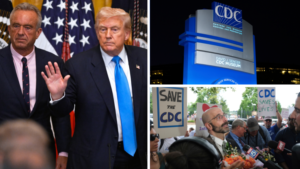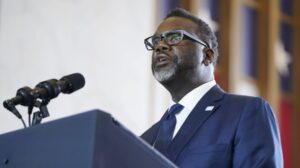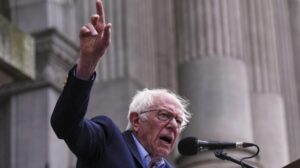Politics
Redistricting wars poised to ‘explode’ as California and Texas make their moves
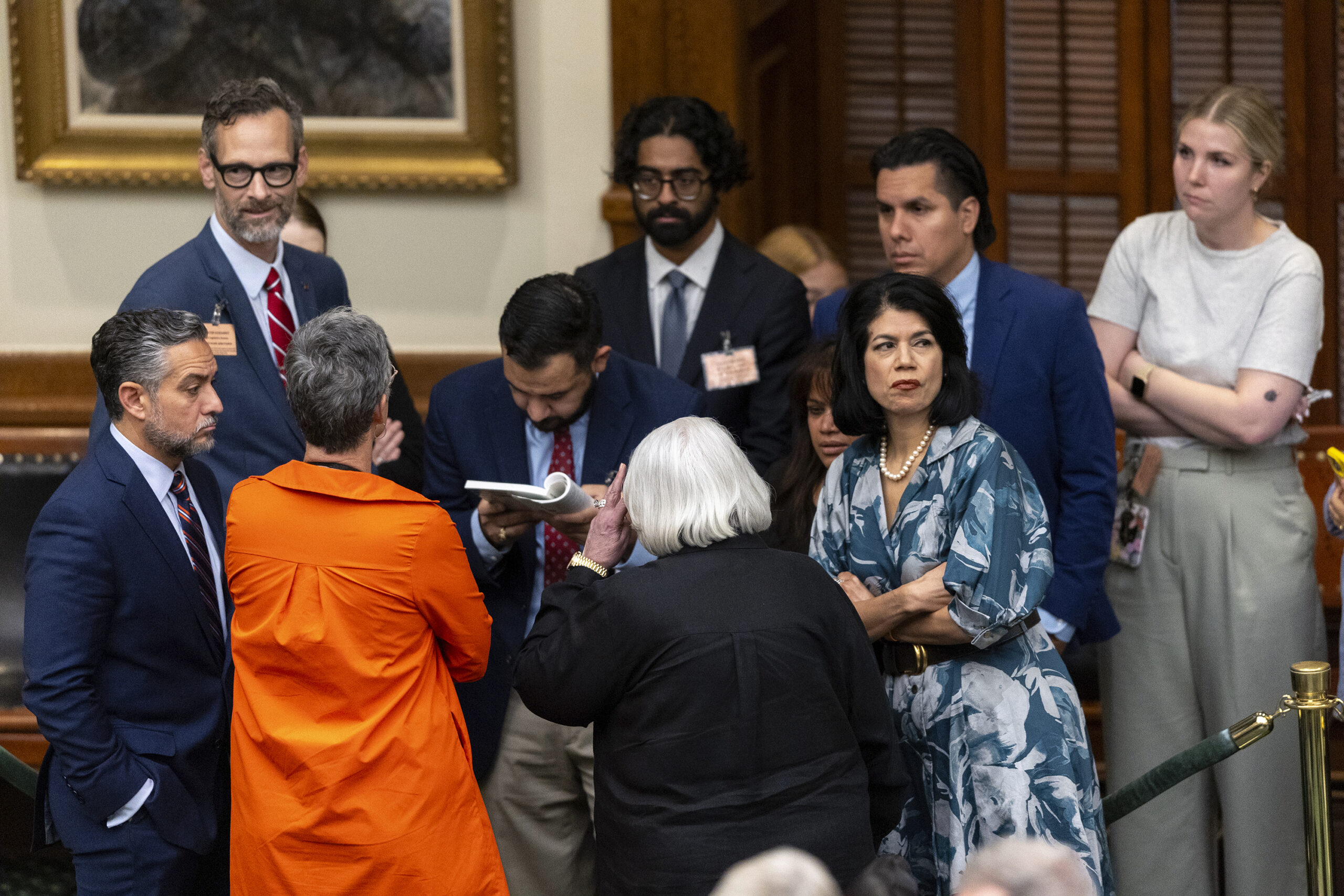
The redistricting war is officially on.
After weeks of bluster from dueling governors and state lawmakers, California and Texas raced forward with parallel action this week to draw new congressional maps, setting into motion a national redistricting fight that could upend the midterms and determine control of the House.
Texas Republicans on Saturday passed a new map that will help the GOP flip as many as five House seats — a partisan play at the hand of President Donald Trump. On Thursday, California Democratic lawmakers and Gov. Gavin Newsom preemptively agreed to send a retaliatory ballot measure to voters — the first step in potentially offsetting Texas’ maneuver by creating new Democratic-leaning seats.
The nation’s two largest states had fired the opening salvo in what is likely to become an intense and protracted redistricting campaign by both parties to grasp power in Washington. Now other red and blue state governors face pressure to follow their lead and aggressively gerrymander their congressional maps.
Republicans hold a clear advantage in the arms race: The GOP is poised to move forward with redistricting in Florida, Ohio, Missouri and Indiana, which could yield at least half a dozen more seats. Democrats, meanwhile, have struggled to get gerrymandering efforts moving in blue states beyond California, though leaders in New York, Illinois and Maryland say they are weighing options.
“Right now, these other states need to step up,” said Rep. Robert Garcia, a Democrat from Long Beach, Calif. “I know it’s hard, I know it’s complicated … But, if you’re a blue state governor, the time is now to step up and get it done.”
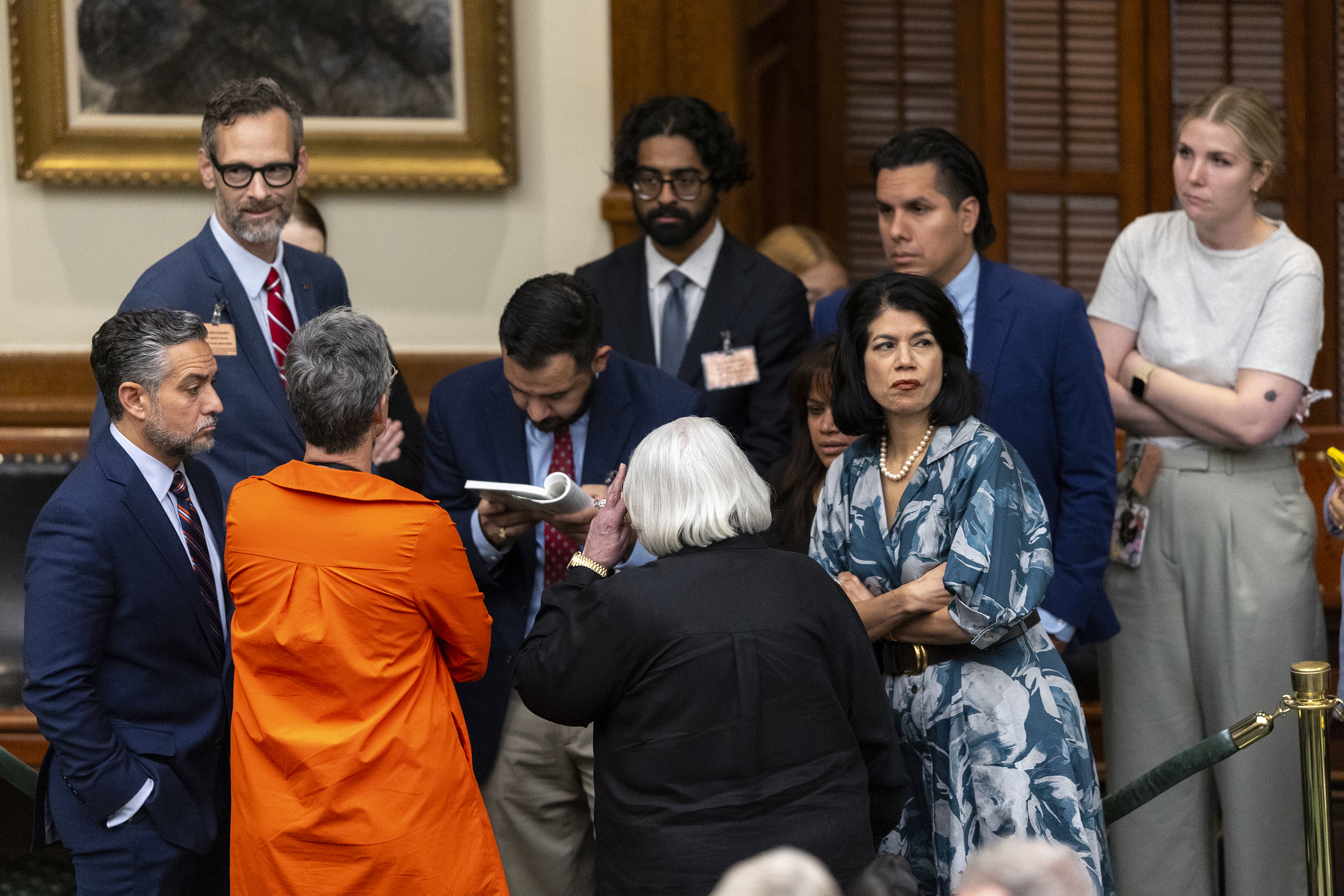
As the map battles continue, at stake is a national shift away from the norm of once-a-decade, Census-aligned redistricting and toward a more polarized landscape in which both parties redraw political maps at will to shift the balance of power. The escalation has major implications for Trump’s post-midterm agenda and the political prospects of several prominent Democrats, including Newsom and his likely presidential run in 2028.
Democrats in the California Legislature framed their vote Thursday in that national context, casting it as a fight to save American democracy from Trump’s “election rigging” — even as they voted nearly unanimously to toss aside lines drawn by the state’s independent commission and put forward a partisan map. The ends, they argued, justified the means.
“We don’t want this fight and we didn’t choose this fight, but with our democracy on the line, we cannot and will not run away from this fight,” said Assemblymember Marc Berman, a Democrat from Silicon Valley.
The vote sets off a Nov. 4 special election for Californians, and both parties are gearing up for an all-out campaign sprint. Democrats estimate they will have to raise up to $100 million to mount an advertising blitz across the state’s large and expensive media markets to convince voters, whom early polling shows are skeptical.
Republicans, who have a thin minority in the California statehouse, unsuccessfully tried to derail the vote with a host of procedural maneuvers. They argued California Democrats betrayed voters’ trust by adopting a map drawn behind closed doors, sidestepping the state’s voter-created redistricting commission. A GOP-backed legal attempt to thwart Democrats’ map was also dismissed by the California Supreme Court on Wednesday.
Assemblymember Carl DeMaio, a Republican from San Diego, called the vote a “political stunt.” When Democrats said he couldn’t use props during his floor speech, he retorted, “Then, why have you become props to Gov. Gavin Newsom’s presidential campaign?”
Texas Democrats, a minority in their state House, have pulled their own stunts. House members prolonged passage of the map by leaving the state for two weeks in protest, denying Republicans the quorum needed to conduct official business. When they returned, Rep. Nicole Collier refused to sign a permission slip ordered by GOP leadership allowing law enforcement to supervise her movements and instead staged a sit-in on the House floor.
Unlike California Democrats’ map, which requires voter approval to take effect, the Republicans in the Texas Legislature were able to approve their map without going to voters or mounting a statewide campaign. Both parties have vowed to fight the maps in court, disputes that could ultimately lead to the U.S. Supreme Court. A lawsuit in Texas was filed just hours after the map was approved by the legislature early Saturday.
“The fight is far from over,” Texas Rep. Gene Wu, chair of the House Democratic Caucus, said on the floor after the map passed the House on Wednesday. “Our best shot is in the courts. This part of the fight is over, but it is merely the first chapter.”
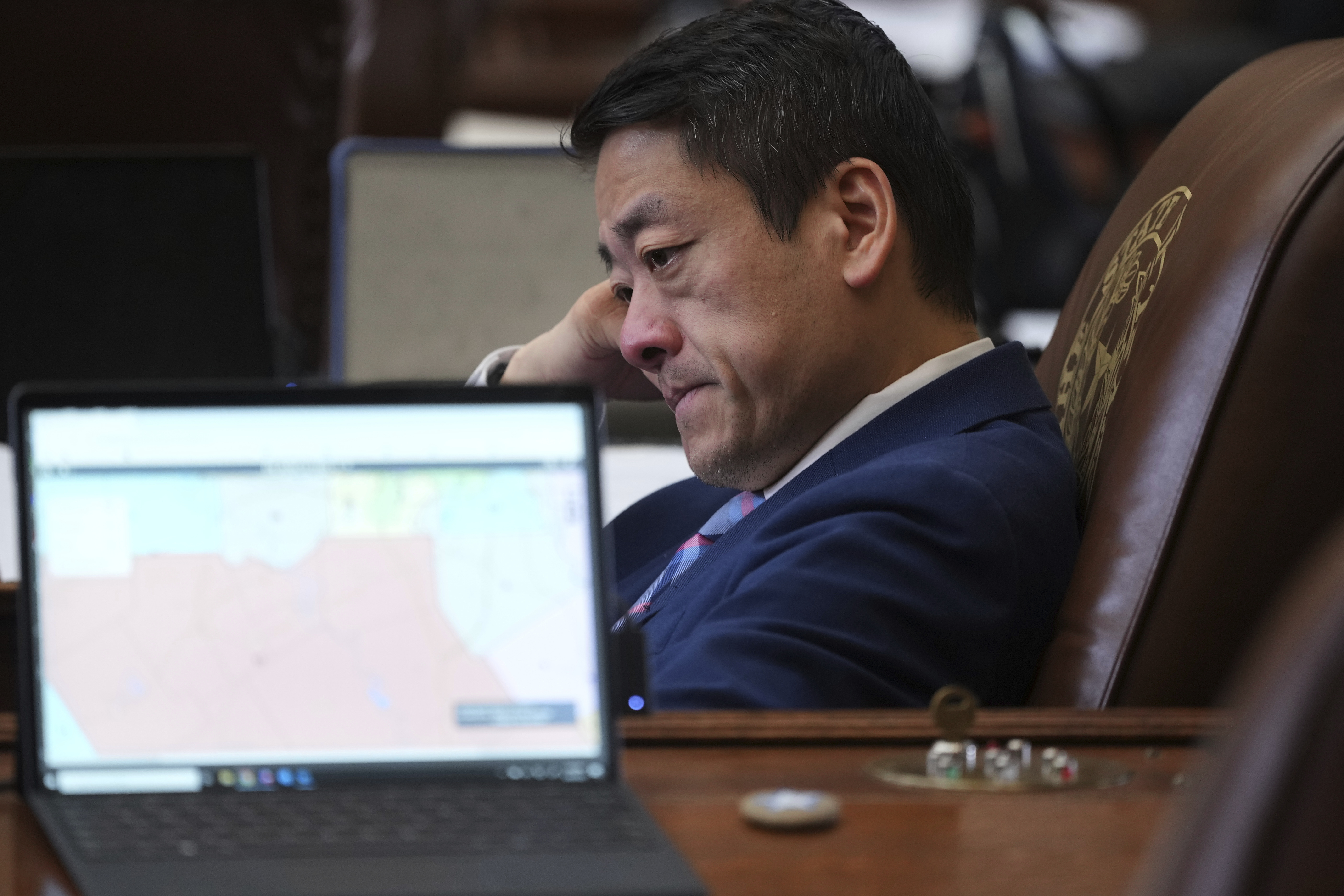
In Texas, Democrats argue the GOP’s map illegally dilutes the voting power of Hispanic and Black voters. In California, where the state’s map preserves minority-opportunity districts, Republicans say the map illegally sidelines the state’s independent redistricting commission.
But in the redistricting wars, voting rights and other legal considerations are taking a backseat to purely partisan interests.
Efforts are underway to carve out more GOP seats in Indiana, Ohio, Missouri and Florida — and Trump’s political operation is pressuring individual state lawmakers to act. On Thursday, Trump declared on X that Republicans in Missouri — where the GOP could pick up one more seat by splitting a district in Kansas City — are “IN!” to call a special session to redistrict.
The legal hurdles for Democrats in other deep-blue states could prove more formidable, hampering their party’s quest to retake the House in the 2026 midterms.
In New York, Gov. Kathy Hochul wants to disband a quasi-independent commission in charge of drawing House map. But the panel, created by a voter-approved constitutional amendment, cannot be erased until 2027 at the earliest.
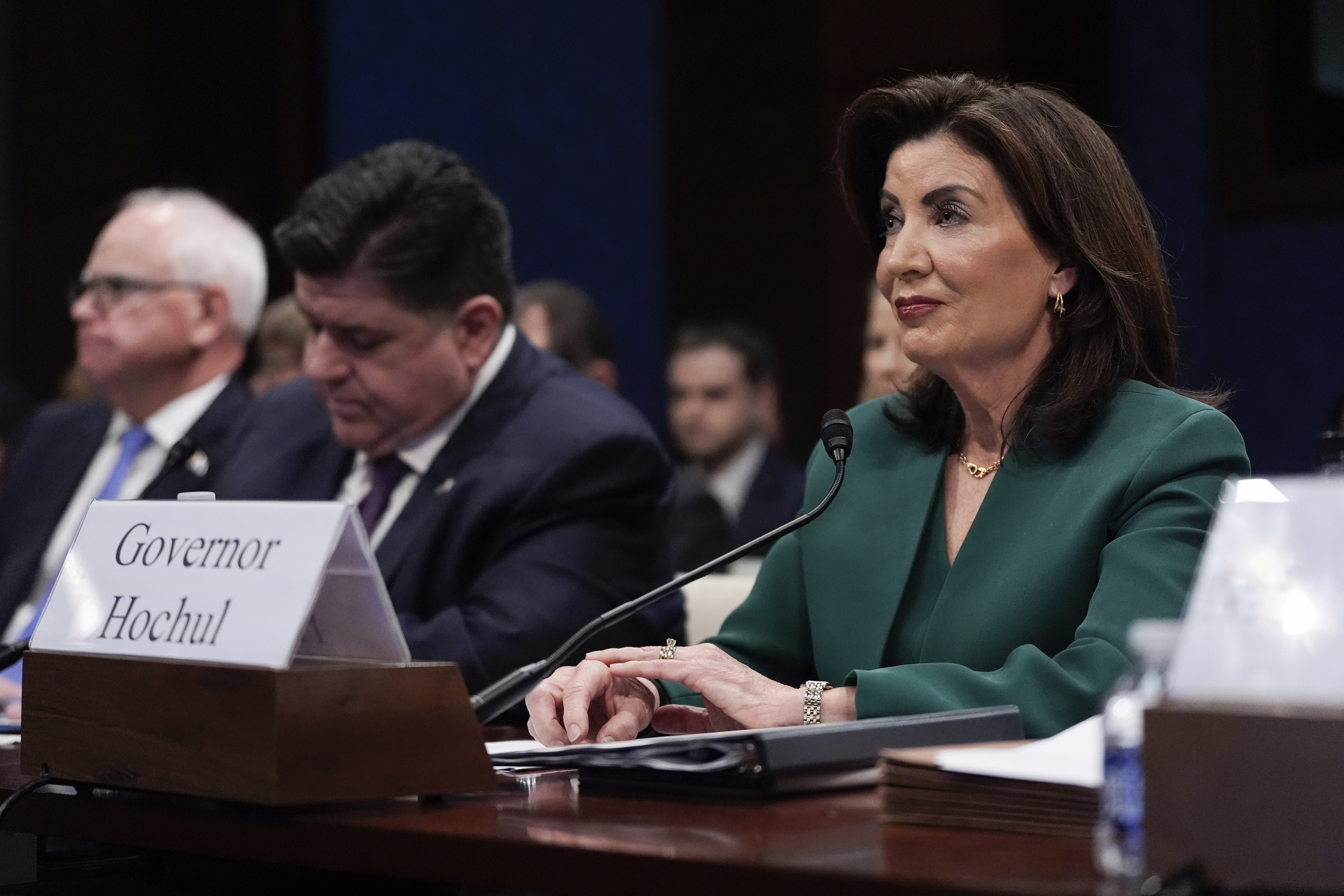
And while the New York governor has talked tough about redistricting, she acknowledged to reporters her hands are tied by the state’s lengthy constitutional amendment process. Any changes must be approved by two separately elected sessions of the Legislature before going to voters in a referendum.
“Now, everyone says, ‘Why don’t you do what Gavin Newsom does?’ Gavin Newsom has a very different situation, because if I could, I would,” Hochul told reporters this week. “But I have to have the Constitution changed, and also the voters approved that change, before I can do that.”
Albany Democrats are under pressure to act faster anyway.
House Minority Leader Hakeem Jeffries, a Brooklyn Democrat, has talked several times in recent weeks with Hochul about their options and this week urged her and other top New York Democrats to expand the state’s voting rights law — which enables legal challenges to local legislative districts — to include congressional seats.
That would open the door to a legal challenge to the existing house lines, a maneuver designed to force a mid-decade redistricting if the map is thrown out. But two New York Democratic officials, granted anonymity to speak frankly, said that would be a long shot given the complexities of the strategy. One of them said there are “no clear options” for what New York can do ahead of the midterms.
That’s leaving Democrats to scour the map for potential redistricting pick-up opportunities outside California.
Illinois Gov. JB Pritzker has spoken boldly about the importance for Democrats to not let Texas go unmatched, and the state hosted many of the Democrats who left the Texas state House. But Illinois has been known for its aggressive Democratic gerrymanders, and it currently has just three Republican seats it can target.
It’s also unclear Illinois Democrats have the political will to take on redrawing the congressional map — most of the redistricting talk this week has been on a whole other set of maps. Former Barack Obama chief of staff Bill Daley, a Chicago Democrat, and Ray LaHood, a Peoria Republican who served as Obama’s transportation secretary, rolled out a “Fair Maps Illinois” proposal this week that would end the process of state lawmakers drawing their own districts.
In Maryland — one of Democrats’ few options to wage a response to the GOP — House Majority Leader David Moon is pushing legislation to open its redistricting process. Gov. Wes Moore has said that “all options are on the table,” but has not laid out any specifics.
“It is not our first choice to fight back against this, and I think it’s everybody’s preference that we stand down and everyone steps back from the brink here,” Moon said in an interview. “But I think the common sentiment you’re seeing from everyone is that we have to be prepared in the event that this thing does explode.”
Shia Kapos and Jeremy B. White contributed to this report.
Politics
Cleveland’s mayor wants Democrats to know millennials like him are impatient and ready to lead
The age of the millennial politician is here — nowhere more obviously than in city halls around the country. Cleveland Mayor Justin Bibb surprised Ohio’s political establishment in 2021 by soaring to victory at the age of 34. The former Obama intern-turned-Key Bank executive is now the president of the Democratic Mayors’ Association and a rising star within the party.
I met up with Bibb — clad in his signature round tortoiseshell glasses and a slim-cut navy suit suit even on a hot and humid Sunday in July. We talked about his city and its relationship with the federal government — from the impact federal cuts may have on his city’s hospital system to his desire to work with Republicans and President Donald Trump on permitting reform.
Over a plate of mac and cheese at trendy Cleveland bistro Luxe, Bibb said that Democrats at large have missed the fact that millennials are impatient — not willing to wait their turn to run for office, deeply entrepreneurial and chomping at the bit to solve the crises they’ve spent their entire lives navigating.
“When I ran for mayor, a lot of folks — a lot of establishment Democrats in the party — told me to wait my turn,” Bibb explained. “We are impatient about this country, because we know what crises look like … because we’ve experienced them firsthand.”
This conversation has been edited for length and clarity.
You’re from Cleveland.
Born and raised in Cleveland. I live in the southeast side, in the Mount Pleasant/Union Miles neighborhood.
I’m not that familiar with Cleveland. So tell me what that means, vibes- or identity-wise.
It’s got a crazy identity in terms of its history. At the height of Cleveland’s prominence — and we were once the fifth largest city in the United States — it was a Jewish middle-class neighborhood. Then you have white flight, redlining, and it became a Black middle class neighborhood.
To this day, there’s still remnants of that. When I was growing up in the 1990s at the height of the crack epidemic in the city, it still had a strong Black middle class, still strong main streets. And one of the reasons why I ran was to try to reverse that decline.
In an interview earlier this year, you mentioned that housing was a policy space where this Congress might make some progress. Have you seen anything helpful since then?
Nothing yet. And what concerns me is that with the passage of this “big beautiful bill,” it’s adding to the deficit, which is going to lead to an increase in interest rates, which is going to lead to an increase in the cost of buying a home.
If there was one space where I think Trump could have some real bipartisan support, it’s around housing. He’s a builder, right?
I think every mayor or governor you talk to wants to see Congress support us on permitting reform at every level of government. And every mayor or governor you talk to wants HUD to streamline regulations so it’s easier to build in America.
Are there other places you see a missed opportunity, where interests align?
I know that the administration is looking at opportunity zones and … childcare tax credits.
And then on immigration reform … The best thing for us to do to be a competitive economy is to pass common sense immigration reform. So instead of all this theater and chaos and this other bullshit, let’s get back to work and let’s find common sense immigration reform. Everybody wants a secure border, but we also need to give people a pathway to citizenship, because if we don’t, we can’t be globally competitive.
You have connections with many other mayors because of the Democratic Mayors Association. Is there any housing policy you’re seeing in other cities that excites you?
A lot of us right now focus on permitting reform. Cleveland will be launching that effort this fall, where we’re streamlining the process to upload your drawings and to get a permit from City Hall.
Really proud of the work that Mayor Todd Gloria has done in San Diego, where he has really worked quickly to decrease street homelessness in the downtown parts of San Diego. That’s declined over 60 percent since he took office.
I look at what Andre Dickens has done in Atlanta, where he has taken old shipping containers and vacant lots and made it a homeless shelter where people have dignity and support to get the second chance they deserve.
What about some of the cuts that have come out of D.C. recently, on education funding or Medicaid. Are you finding any ways to backfill these cuts?
I think every mayor in the country will agree with this: There is no replacement that we can find to plug in the gaps from the federal government.
Cleveland is home to our only safety net hospital, Metro Hospital, and they could go out of business if these cuts go through. What’s striking is that [Trump] worked to put some provisions in this bill with Republican senators to help rural hospitals, but nothing to support urban hospitals. That’s gonna decimate our public health infrastructure.
And residents in Ohio are going to feel any impacts sooner, because Ohio also rolled back state Medicaid expansion — right?
Correct.
The state cuts … will put a further strain on hospitals like the Cleveland Clinic, Metro Health and emergency hospitals. It’s an issue of public safety, because people may be committing crimes out of survival now, because we no longer have a strong social safety net.
All these things are interconnected. It’s easy for the president and Republicans in DC to try to say, “Democrat-run cities are unsafe.” But they’re the ones making our country less safe by passing these uncompassionate, crazy bills.
I totally understand that you can’t replace the federal cuts. But you said at your State of the City address that you were looking for philanthropic avenues to try to help in other ways.
I’ll be convening healthcare CEOs and hospitals, I’ll be convening my foundation leaders, to figure out what we can do to stand in the gap until we get change from the federal government.
One idea is how do we start to promote more preventative care to make sure that folks aren’t getting sick before they need to go to hospital. I’ll be working with Metro Health Hospital, our local social safety net hospital, to get folks enrolled in the exchanges before these changes occur so they can get the care they need. And I have a mobile health clinic that we deploy at my department of public health as well. So all of the above is on the table.
You’re a millennial. What are Democrats missing about millennials?
That we’re impatient.
Say more.
When I ran for mayor, a lot of folks — a lot of establishment Democrats in the party — told me to wait my turn. We are impatient about this country, because we know what crises look like … because we’ve experienced them firsthand — from 9/11 to the great recession to two wars in Iraq and Afghanistan to the pandemic.
But we’re also the most entrepreneurial generation as well.
Follow-up question — though I don’t know how qualified we (millennials) are to talk for them — about Gen Z. In the 2024 election, nationally, millennials stayed the most blue. Gen Z swung toward Trump.
Gen Z sees a rigged system.
But we (millennials) do too, right? Why does it hit different?
I think for Gen Z … they see all the massive amount of wealth being created because of technology and the proliferation of Amazon, Uber, what have you. They don’t understand why we can’t get our shit together and fix this stuff quickly.
They looked to someone like Donald Trump, who is the disrupter, to fix it.
The reason why he’s losing his base on Epstein and the Epstein files is because they thought they could trust him as the disruptor. He would be transparent. We want transparency … and now they’re not getting that.
What do you want Democrats in D.C. to do more of?
Listen to mayors. We are closest to the challenges and the pain of what this federal destruction looks like, but we’re also closest to the damn solutions. We know how to fix America’s housing problem because we’re doing it. We’re fixing public safety in cities like Cleveland, Baltimore, Atlanta. We know how to create good quality jobs with union and labor being a key partner.
The answer to the Democratic Party’s future and problems will not come from congressional D.C. Democrats. It needs to come from America’s mayors and America’s governors.
Your summer playlist — What are you listening to right now?
Drake is solid. I listen to a lot of Jungle, I love Jungle. I’ve been in a classic Jay Z mode too, recently. I feel like Jay Z [and] Memphis Bleak is like my quintessential growing up in this city [in the] summer vibe that gets me in a good mood.
I just sent my barber my [Spotify] day list. It was called “luxury barber shop Sunday afternoon.” And he’s like “Dude, it’s straight bangers.”
You know he’s playing it at the barbershop right now … And they’re like, “this is the mayor’s playlist.”
[laughing] Exactly, yeah.
Politics
Sunday shows preview: Trump administration faces fallout from CDC leadership shakeup
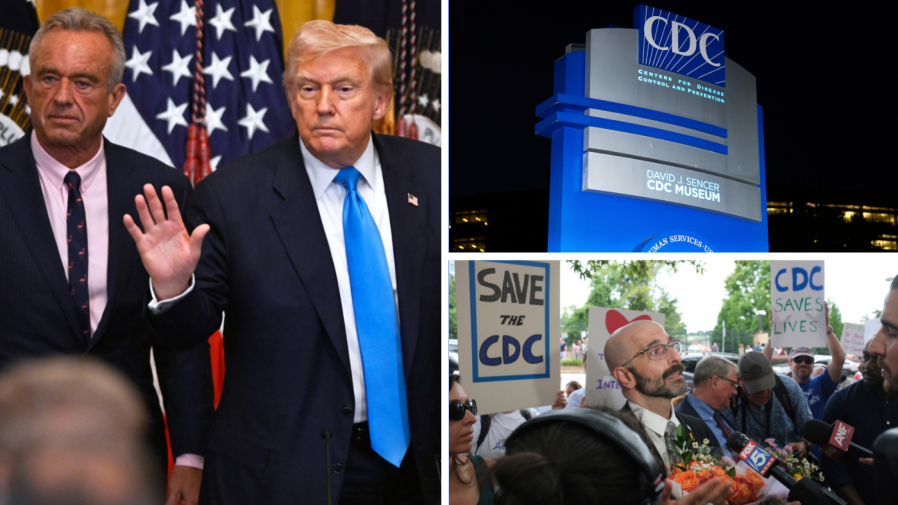
President Trump’s administration is facing fallout from this week’s leadership shakeup at the Centers for Disease Control and Prevention (CDC), where the agency’s director was terminated and other top officials resigned. The president fired Susan Monarez on Wednesday after she clashed with Health and Human Services (HHS) Secretary Robert F…
Read More
Politics
Chicago mayor vows to fight Trump intervention, signs protective order
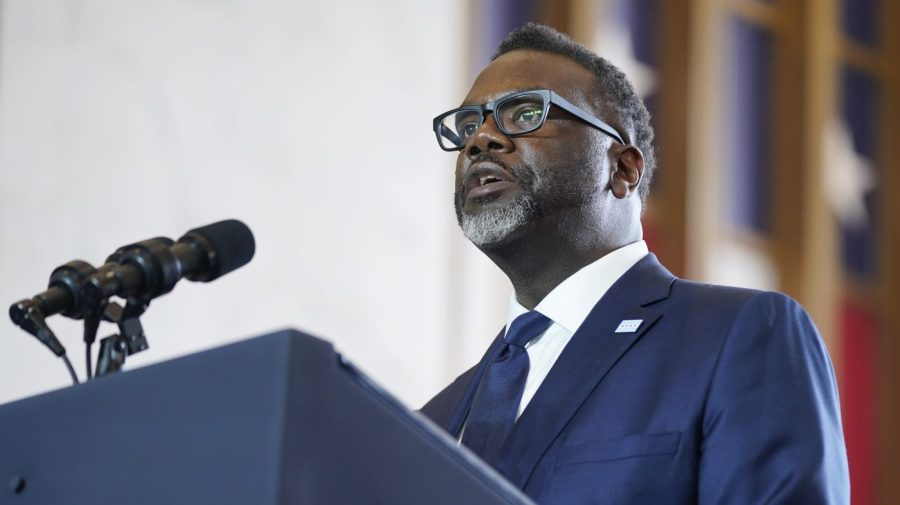
Chicago Mayor Brandon Johnson (D) signed an executive order detailing how the Windy City will attempt to respond to President Trump’s potential deployment of the National Guard. Johnson’s executive order, which he signed on Saturday, established the “Protecting Chicago Initiative” to protect the constitutional rights of Chicago residents amid the “possibility of imminent militarized immigration…
Read More
-
Uncategorized10 months ago
Bob Good to step down as Freedom Caucus chair this week
-

 The Josh Fourrier Show10 months ago
The Josh Fourrier Show10 months agoDOOMSDAY: Trump won, now what?
-

 Politics10 months ago
Politics10 months agoWhat 7 political experts will be watching at Tuesday’s debate
-

 Politics6 months ago
Politics6 months agoFormer ‘Squad’ members launching ‘Bowman and Bush’ YouTube show
-

 Politics10 months ago
Politics10 months agoHow Republicans could foil Harris’ Supreme Court plans if she’s elected
-

 The Dictatorship6 months ago
The Dictatorship6 months agoPete Hegseth’s tenure at the Pentagon goes from bad to worse
-
Economy10 months ago
Fed moves to protect weakening job market with bold rate cut
-

 Politics10 months ago
Politics10 months agoRFK Jr.’s bid to take himself off swing state ballots may scramble mail-in voting


